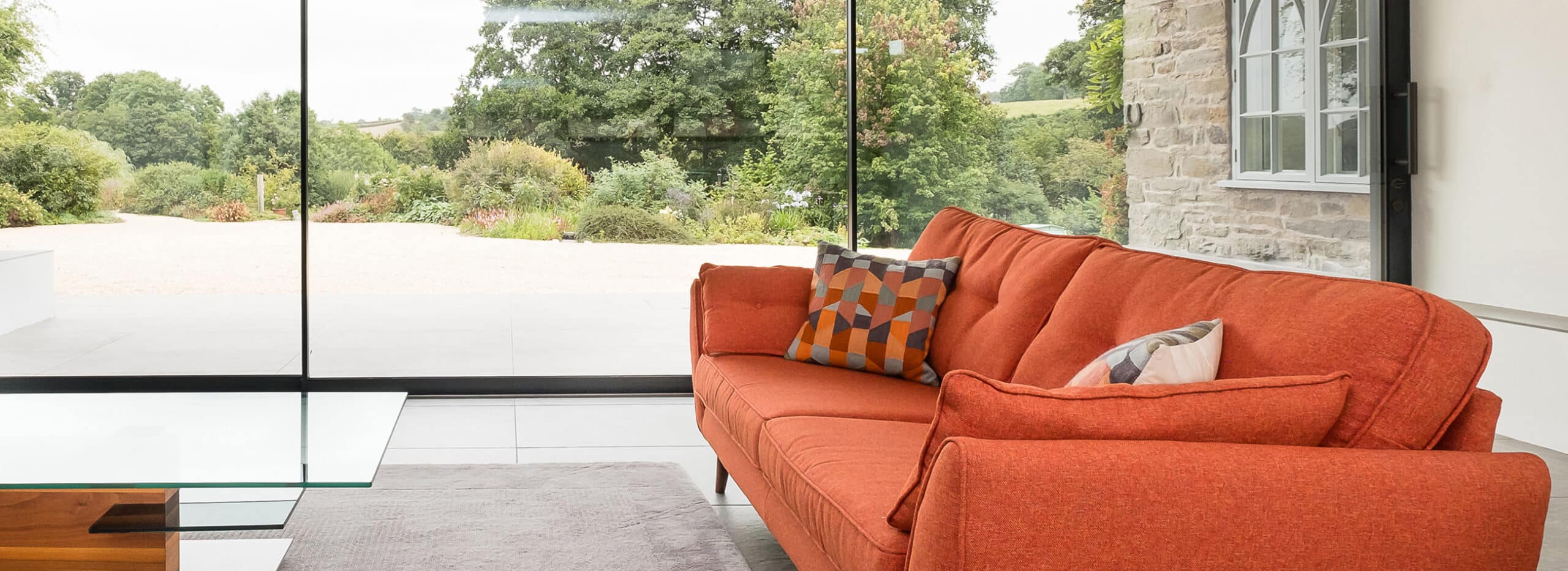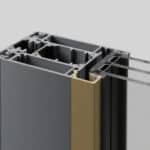
Over the past decade, sliding door technology has advanced significantly, with panels becoming larger and frames slimmer. While bifold doors were once the top choice for those undertaking extensions, renovations, or self-build projects, sliding doors have now emerged as the preferred option for most homeowners.
Given the British climate, glazed doors tend to remain closed for most of the year. However, the slim frames of sliding doors (like theEDGE2.0 with narrow 20mm sightlines) help breakdown the boundaries between between indoors and outdoors. This design creates an almost seamless connection between the home and garden, providing the benefits of outdoor views all year around—not just during the summer months.
Advances in sliding door technology have completely transformed their appearance. The bulky patio doors of the past have been replaced by sleek, high-performance aluminium systems, with some systems capable of achieving individual panels up to a massive 6 meters wide.
A key factor that has driven is the development of glazing. For most doors and windows (whether they are made from aluminium, timber, or uPVC) the double or triple-glazed units are secured using a glazing bead. This bead clips or attaches to the inside of the frame, keeping the glass in place— a process known as dry glazing.
While many sliding door systems still use this method, adding a dry glazing bead on all four sides makes it difficult to achieve the ultra-slim sightlines required for modern designs. As a result, an alternative approach was taken by some manufacturers to create a sleek, minimalist look.
To overcome not being able to accommodate a glazing bead, some door manufacturers have opted to glue (or bond) the glass directly to the frame. This holds the pane in place; gives the system the rigidity required to operate and achieves the slim sightlines many homeowners want. These types of sliding doors are known as structurally bonded systems.
One potential drawback is the use of permanent adhesive in this method. Since the glass is bonded to all four sides of the frame, replacing it requires the entire sliding panel—both the glass and the frame—to be removed and replaced as a single unit.
This means you have to completely remove the panel from the outer frame – a real challenge once you have layed your patio or rendered the returns of the reveal).
You are also completely reliant on the company that you bought the door from being able to manufacture or supply a new panel. If your original supplier (or their supplier) is no longer trading or the range of door is no longer in production, then replacing a panel could be impossible and may even mean you having to replace the entire door system.
“Over the past 2 or 3 years we’ve spoken to a number of customers whose glass has shattered on their existing sliding door system and when they’ve made contact with their supplier they’ve discovered that they are either no longer trading or that door system has been replaced, meaning they can’t get a replacement panel for their home and have needed to order a completely new set of doors.”
Some ultra-slim sliding door systems, such as theEDGE2.0 from IDSystems, use a semi-bonded approach rather than being fully bonded. In this method, the glass is bonded only at the interlock (where the panels meet) while the other three sides are secured with a glazing bead.
Although this results in a slightly larger outer frame, it doesn’t compromise the view through the doors, offering central sightlines as slim as 20mm. This glazing method allows for just the glass to be removed and replaced if needed, meaning repairs are simpler and more cost-effective, as only the pane needs to be swapped out rather than the entire panel.
The terms of warranties for sliding doors will vary by manufacturer and supplier, but it is not typical for accidental breakage of glass to be covered, meaning most homeowners claim for replacing the glass on their home insurance. Although it depends on your coverage, most home insurance policies will cover replacing the glass but not replacing a whole panel (and certainly not a whole new door system) – meaning you are at risk of being left with a hefty bill if you opt for a structurally bonded system.
For fully bonded systems, only the original supplier will be able to replace the glass since the entire panel must be changed. This could pose challenges if, for example, the manufacturer no longer produces that particular system.
In contrast, with semi-bonded systems, any door or window company can replace the glass. The glazing beads can simply be removed, allowing for the old glass to be swapped with a new sealed unit. This eliminates the need to remove the door’s panels, tracks, or side jambs, making the repair process far less complex. Additionally, you won’t be entirely dependent on the original supplier for future repairs or replacements, offering greater flexibility post-installation.
For more information about theEDGE2.0 semi-bonded sliding door or the dry glazed Grand Slider II system visit our aluminium sliding doors product pages.